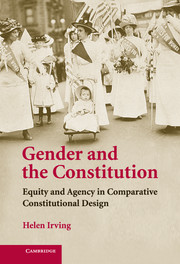5 - Representation
Published online by Cambridge University Press: 08 December 2009
Summary
To be full members of the constitutional community, women need be represented and take part in the processes of law making. This means inclusion in all its dimensions, formal and informal, central and surrounding. Such processes include recruiting, preselecting, electing, influencing, and removing the law makers, as well as becoming law makers in their own right.
Once again, the issues relating to these processes cannot be addressed merely in terms of rights. Many are structural, arising prior to the enactment and enforcement of rights. Indeed, structures and institutions will, to some extent, determine the very way in which rights are conceptualized and the form in which they are adopted in a jurisdiction. Structures, institutions, and processes are not merely the preconditions for gender equity in legal rights; rather, they are fundamentally embedded in the way in which a country's constitutional system responds to, represents, and advances the needs, interests, and potential of its members. Institutions of representation and participation are not merely a means to an end, or simply facilitative of rights and goods; they are also transformative and generative of capacities and goals. Institutional practices shape human outlooks, expectations, and capabilities as much as they give voice to them.
Rights are certainly relevant. A sine qua non of inclusion – it goes without saying – is the right of women to vote and to run for election to their country's legislature on the same democratic footing as men.
- Type
- Chapter
- Information
- Gender and the ConstitutionEquity and Agency in Comparative Constitutional Design, pp. 109 - 133Publisher: Cambridge University PressPrint publication year: 2008



